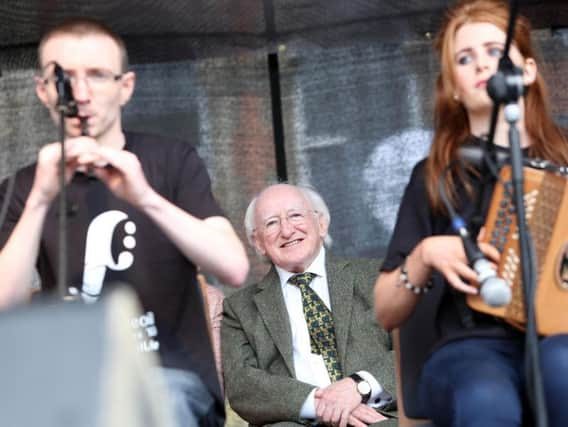President Michael D. Higgins to hail Ireland's civil rights capital on October 5 anniversary


In what many believe was the start of the ‘Troubles,’ people had marched for fair housing allocations and for an end to unionist majoritarianism on October 5.
President Higgins has been asked to deliver the keynote address of the international Civil Rights Festival in the Guildhall at 2 p.m. in what will be the sixth visit to Derry of his inaugural term.
Advertisement
Hide AdAdvertisement
Hide AdHis decision to accept the invitation of the Civil Rights Commemoration Committee to attend the half-centenary celebration of the Northern Ireland Civil Rights Association (NICRA) demonstration, indicates the importance he attaches to this epoch-making event.
Fifty years ago today civil rights demonstrators were infamously batoned off the streets of Derry at Duke Street by members of the RUC in a pointed and successful attempt to prevent them from reaching their final destination of The Diamond.
Over the course of the baton charges and a subsequent two days of rioting at least 61 civilians (including seven women and eight children), eight police officers and one fireman were treated at Altnagelvin Hospital, according to the official statistics of the time.
It was a watershed moment and ultimately helped set in train a sequence of events that would end the old Stormont regime.
Advertisement
Hide AdAdvertisement
Hide AdTomorrow President Higgins will pay tribute to the Civil Rights Commemoration Committee and, in one of his final engagements prior to the Irish
Presidential Election, he will argue the civil rights movement’s emphasis on non-violence and collective action, was an example then and can be an example today.
His speech will be preceded by a choral arrangement of civil rights songs and followed by a rendition of the gospel song that became a civil rights anthem, ‘We Shall Overcome’.
During his term in office, President Higgins has led the commemorations marking the centenaries of some of the key events in Irish history including the 100th anniversary of the Easter Rising in Dublin over two years ago.
Advertisement
Hide AdAdvertisement
Hide AdRepresenting the people of Ireland during the half-centenary commemoration of the Duke Street march in Derry tomorrow, President Higgins is expected to say that his role in these commemorations was not only to recall the stories and experiences of individuals and communities.
It was also to reflect on the social and economic forces with which they contended and which they sought to shape, he is expected to suggest.
President Higgins has already made significant contributions to the public debate on these issues, drawing attention to the importance of embracing the complexities of our past and calling history, what he has described as, the ‘inheritance of all our people’.
In his speech in Derry’s Guildhall the President is, therefore, expected to reflect on the origins of the Civil Rights Movement in Northern Ireland, situating it against the social and political background of the time.
Advertisement
Hide AdAdvertisement
Hide AdBut the ‘Journal’ understands he is also set to place the events in Derry within the context of the wider global struggle for human rights of the period.
He will argue that this was inspired by a vision of human rights that extended beyond personal or individual rights to collective rights, something which has been a recurring theme of his presidency.
He is also expected to make the argument that the example set in Derry on October 5, 1968, like the example that was set in Selma, Alabama, over two years earlier can be an inspiration for those who wish to confront the challenges facing Ireland and the globe today.
The ‘Journal’ understands the President will reflect on the movement’s legacy, paying tribute to the Good Friday Agreement and reflecting on the continued relevance of the civil rights movement’s emphasis on non-violence to achieve transformative change.
Advertisement
Hide AdAdvertisement
Hide AdHe is expected to argue that the movement’s message is as relevant as ever.
He will claim that this is especially true as we are called to confront the great challenges of the coming century: climate change and sustainable development.
President Higgins has previously visited Derry in April 2012, March 2013, August 2013, March 2017 and May 2018.